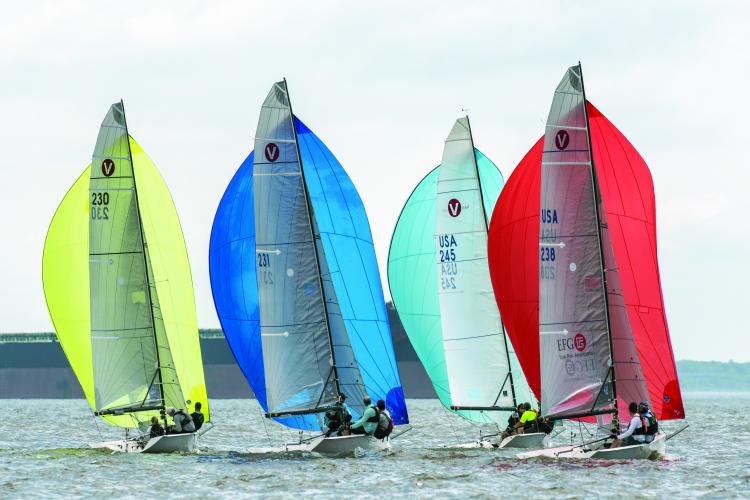Overcoming Obstacles to Perform Better When Racing
Want to enhance your racing performance on the water? Here are nine tips from Dr. Tim Herzog:

As a Mental Performance Coach, I’m often asked for “silver bullets” (sure fire techniques), to achieve “bullets” (wins) on the race course. Folks often think that if they can just master a technique such as mental imagery, they will magically be on top.
A common misperception is that visualization of crossing the finish line in first contributes to it actually happening. Ironically, this kind of imagery can actually make it less likely, because an athlete may unwittingly believe that success has essentially happened already without putting in the hard work to make it happen. But envisioning all the possible obstacles, and ways to overcome those obstacles, can make achievement more likely.
And so, I used to say I had no real silver bullets, but in recent years I’ve made a point of saying I have two “almost” silver bullets.
Almost Silver Bullet #1: Breathing.
“Breathing?!” Yes, breathing. Paced breathing based on heart-rate variability science, not based on the latest fad, can contribute to self-regulation: a mentally calm and physically alert state of being, conducive to shifting focus to what’s most important right now. Everyone has a signature breathing pace that can be detected with equipment called biofeedback, which tends to be around six breaths per minute (four seconds inhale and six seconds exhale).
Some simple apps can help you practice pacing your breath at that exact pace or one that feels even better. Scientists haven’t yet figured out the best paced breathing “dosage,” but many research protocols have people breathing for 20 minutes per day for 10 weeks. Talking with top experts, and anecdotally with my clients, I’ve found that doing more is better, but that committing to even 10 minutes per day can have some impact.
Paced breathing has the power to optimize your mind-set in the midst of a stressful moment (such as before the start of a race, or before a crowded leeward mark-rounding). One of my clients put it perfectly: “Your mind is in the fog… breathing makes it clear. It helps you focus on the immediate/important tasks, and lets superfluous thoughts go.”
Almost Silver Bullet #2: Sleep.
Thanks to a macho culture, sleep has long been regarded as optional. Add sailing’s party culture into the mix, and quality sleep is deemed even less important. But guess what? Sleep is a huge performance factor. Not only do adults need seven to eight hours sleep (kids need more) for health, we also need it for memory, reaction time, and concentration.
Even mild sleep deprivation can impair performance; being awake for 17 to 19 hours can deteriorate performance as if you’ve got .05 percent blood alcohol content. Staying awake for only one or two hours more can impair it to a .10 percent level. People who sleep less tend to be less fit, so maybe it’s even more important on a windy day.
Seven More Tips
Want to improve sleep to enhance performance? Here are seven more tips to keep consistent between practice and regattas…
1. Practice good sleep habits: Maintain a regular bedtime; avoid blue light from devices; avoid social media before bed (it will wind you up); reserve bed for sleep (or sex) only; and keep your room cool and dark.
2. Consider therapy: Everybody can benefit from therapy, and Cognitive Behavioral Therapy for insomnia (CBT-i) offers some concrete ways to tackle sleep.
3. Work out in the morning: Early workouts can ensure faster and higher quality sleep the next night (and it’s often a nice way to warm up before a regatta if you don’t overdo it).
4. Caffeinate when you have to: Avoid a daily routine of caffeine, which can mess with subsequent sleep, but use it strategically to maximize positive impacts.
5. Stock up on sleep: You can actually bank some sleep in advance of sleep loss. You can even enhance performance. One study with basketball showed that 10 hours sleep/day led to faster sprints and better shooting accuracy. Another showed improved tennis serves after only nine hours/night.
6. Take strategic naps: This can be particularly relevant for offshore sailing when a watch schedule needs to be devised. The “circadian trough” (when one can be most impaired) is between 3-5 a.m. and between 1-3 p.m. Whoever needs a nap most (because they are most deprived or they acknowledge or demonstrate impairment) should ideally nap during this time. Keep in mind that there should be some time built in to wind down and then some time to snap out of grogginess.
7. Don’t worry about perfectly timing wake-up: As long as you have enough time to snap out of grogginess, a higher quantity of sleep is better for performance.




